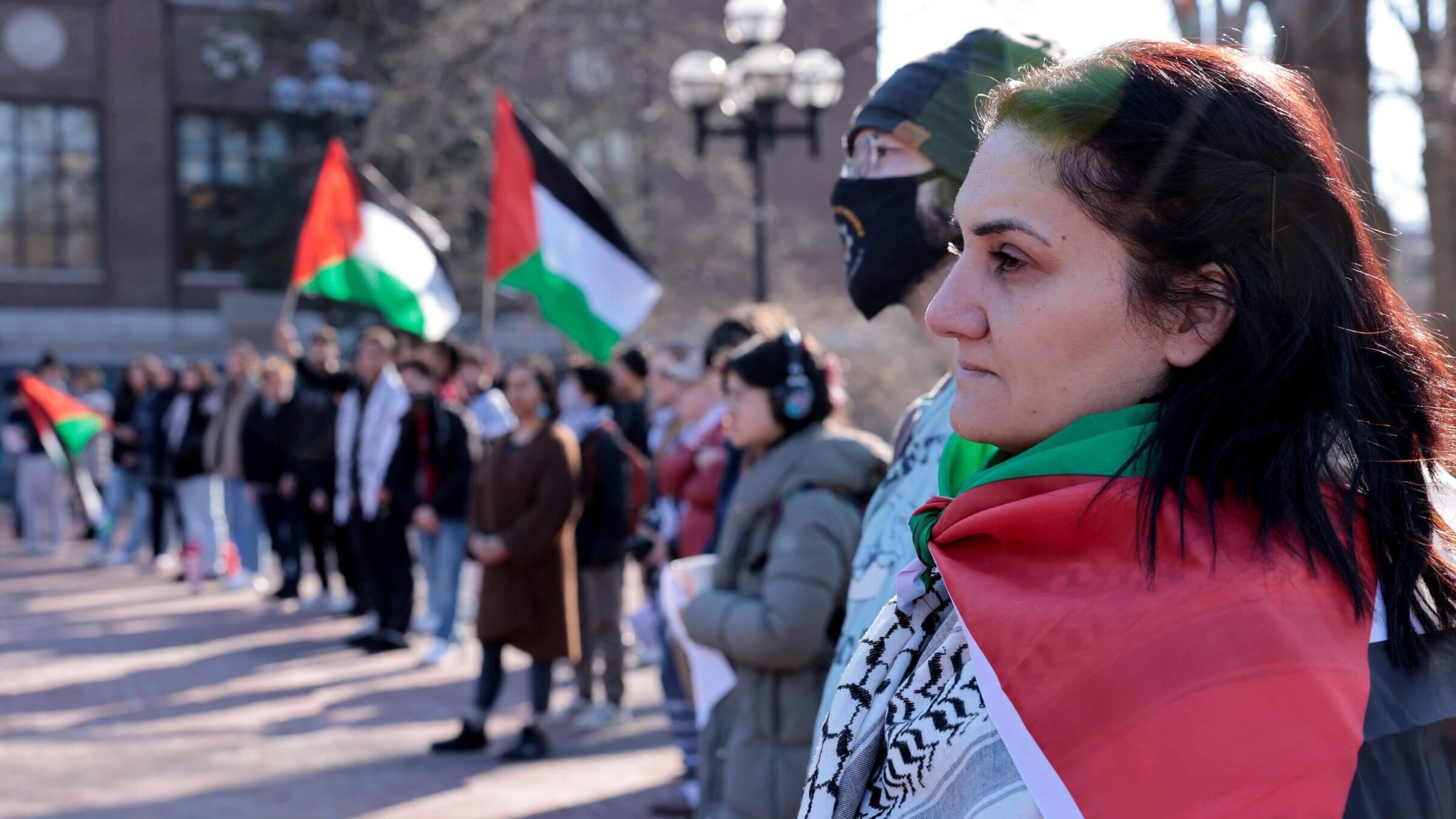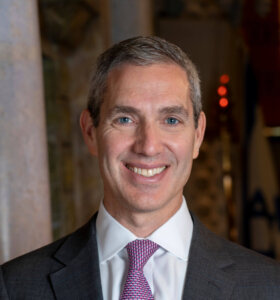I gave a college lecture on Jewish identity — and confronted a mob of video vigilantes
What happens when the person they’re protesting on campus is you

Protesters call for a ceasefire in the Israel-Hamas war. Photo by Jeff Kowalsky / AFP / Getty Images
SAN BERNARDINO, Calif. — As I walked into the lecture hall on the Cal State University campus here, someone handed me a flyer. The headline screamed, “Genocide Enablers Are Not Welcome.” It denounced the evening’s speaker for being “actively involved in financing war crimes and crimes against humanity in Gaza,” and asked how could the university have dared to invite him to campus.
The flyer featured images of human suffering in Gaza and, smack in the middle, my name. I was the speaker the university had dared to invite. I was the object of the angry protest.
It did not matter, apparently, that I was not there to talk about Israel or the war, but to deliver a lecture on contemporary Jewish identity in honor of one of the region’s great rabbis, Hillel Cohn. To the dozens of students and faculty members chanting and waving signs outside the auditorium, it seems, any Jewish leader is subject to attack.
I am grateful that they did not disrupt my talk, and I never felt physically unsafe (after the event, I was whisked away by campus police — Mick Jagger-like — and escorted not just to my car, but all the way to the highway).
The depressing part was my post-lecture exchange — or, more precisely, non-exchange — with students.
I cannot even remember their exact questions, because I was so distracted by the smartphones: Every person asking me something seemed to have a sidekick recording my every word and move.
In the days since, I have compared notes with friends and come to understand that such vigilante videography is a well-worn tactic of our time. An electronic ambush, a TikTok takedown: The idea is to catch an off-the-cuff hot-mic moment that can be clipped and posted to social media, bolstering the poster’s clout and cause — and sullying the character of the sad sap caught in a gotcha moment.
I came to campus ready and willing to talk to anyone about pretty much anything — especially college students who hold views contrary to my own about Israel. But when confronted with the smartphone as a weapon, I shut down.
It was clear the students’ goal was not dialogue but performance. I told them I would be happy to talk, to listen, and to debate, on the condition that they put their phone cameras down. An exchange of ideas — by all means. A clip for their Instagram feed — no way.
They refused; I walked away.
It was all so very sad. An opportunity for dialogue and discourse, a chance to challenge someone’s views and have my own views challenged, a chance to see that despite our differences, we can dignify each other’s humanity. A lost chance, perhaps, to build a bridge.
There is nothing wrong with the proliferation of smartphones in the public square — and sometimes everything right with our ability to record in real time. Documenting a fender-bender, catching a comedian using an offensive slur — accountability is a good thing. When I told this story upon my return, our rabbinic intern, former Forward reporter Aiden Pink, reminded me that it was only because of a 17-year-old bystander’s phone video that George Floyd’s death was exposed for the brutal police murder that it was.
Long before our present technology, Louis Brandeis, in his famous 1913 article “What Publicity Can Do,” reflected on the wickedness of people shielding wrongdoers, making his famous comment that “sunlight is said to be the best of disinfectants.” When done right, a well-placed video clip can play an important role in our democratic process.
And when done wrong, when the cell phones come out, when dialogue is reduced to a performative exercise, both sides lose.
The person holding the recording device is not thinking about the exchange of ideas but about the clever or damning post to follow. As for the person being recorded — the other night, yours truly — the shields go up, the introspection goes down, and the possibility for reflective and creative dialogue disappears.
Exchanging ideas in a mind-changing dialogue requires a degree of vulnerability. One must be able to state one’s views plainly and honestly, sharing the personal and collective experiences that root them and give rise to them. Our beliefs are reflections of our biographies; to share them is to share part of ourselves.
Dialogue means giving expression to who we are and listening attentively, intently, and most of all, empathetically to who the other person is. An idea is tendered, countered, sharpened, reframed and tendered again and again and again. We allow our views to be challenged, and we interrogate them ourselves, even as we challenge the thoughts and opinions of our sparring partners.
There is a reason that every historic negotiation — be it Oslo or Bretton Woods — happened in some press-free location. For the parties to speak their hearts and minds and, most daring of all, expose their doubts to another, it cannot be performative. You have to be able to be human — to go for a walk in the woods and chat with your guard down.
Absolute truth belongs to God alone. The debate of ideas is meant to nudge us closer, but never fully to, that truth. Sometimes, lo and behold, we change our minds. In all times, hopefully, we come to appreciate another person’s views as situated in their humanity.
In the words of the late rabbi, scholar and activist Arthur Hertzberg, “One cannot affirm one’s own certainties without engaging in the counter-certainties of another.”
In my 25 years as a rabbi, of the incalculable number of people who have voiced disagreement with me, it has been those who invited me for a coffee to quietly debate a position that are not only the people whose opinions I respect most, but the people whose views have shaped my own.
The student body of Cal State San Bernardino is diverse; 80% of the undergrads are the first in their families to attend college. The epilogue to my evening — both solace and sorrow — was an email I received upon my return, the reflections of a Jewish student present at the lecture, the child of immigrants from the former Soviet Union.
He expressed gratitude for my talk but said the protests made him lonely and scared. Given his family history, he was well aware of the toxic effects of non-democratic and antisemitic regimes. How sad, this student wrote, to see those same hardened hatreds now take root here.
The once fertile soil of our country has grown less and less capable of producing the fruits of reasoned debate. As a Jewish community in our charged times, we feel the pinch acutely.
If you want to talk about war, peace, humanitarian values — just tell me where and when, and I’ll show up. You bring your ideas, I’ll bring mine, and let’s be vulnerable one with another and appreciate our shared humanity, whatever the differences in our views may be. And let’s leave the smartphones in our pockets.





















